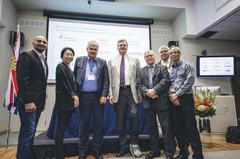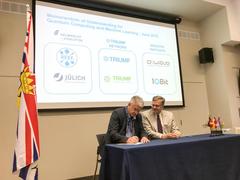Group photo on the occasion of the signing of the MOU: Kausar Samli (1QBit), Kathryn Hayashi (TRIUMF Innovations), Joachim Mnich (DESY), Jonathan Bagger (TRIUMF), Rudolf Mey (Acting German Consul General in Vancouver), Ingo Müller (German Consulship in Vancouver), Warren Wall (D-Wave Systems), photo: TRIUMF.
The Helmholtz centres DESY and Forschungszentrum Jülich, the Canadian particle accelerator centre TRIUMF and the companies D-Wave Systems Inc. and 1QBit have signed a Memorandum of Understanding (MOU) to establish a network to pool their strengths in the research and use of quantum computers, data analytics and in particular machine learning. The idea for the cooperation came from a Helmholtz delegation´s visit to Canada led by President Otmar Wiestler.
Quantum computing and big data are currently one of the most exciting topics and at the same time one of the greatest challenges in science and technology. In recent years, the amount of data produced worldwide has increased exponentially both in research institutions and in the private sector. This development has created new interdisciplinary methods and tools that change the way research is conducted, create new business opportunities and thus accelerate research and innovation. These rapid changes are the reason for an agreement now concluded between German and Canadian organisations to expand and shape possible applications in the areas of large scale computing, big data, machine learning and quantum computing.
The networks are intended to facilitate national and international cooperation in the use of quantum computers and machine learning tools to support research and are open to other partners during their development. The networks comprise four joint working groups focusing on four pillars of data science: Quantum Computing, Large Scale Computing, Machine Learning and Big Data Analytics.
“The cooperation between high-tech research centres and innovative companies is an ideal alliance to find intelligent solutions to today´s questions in quantum computing and big data science and also to develop new applications beyond research,” explained Joachim Mnich, DESY´s Director for Particle and Astroparticle Physics, who signed the MOU for DESY. “We are not only united by common interests, but also by enormous creativity in solving major problems. I see great potential for innovation here.” In addition to the implementation of methods for analysing large amounts of data, direct applications for DESY could be the automated control of particle accelerators by means of machine learning.
The network partners will contribute resources and expertise to the collaboration to advance their initiatives of common interest. Another important goal of the network is the training of young scientists; the partners want to develop framework conditions and financing possibilities for this.
The signing of the agreement is a result of the Data Science and Quantum Computing workshop that took place in Vancouver (Canada) at the end of June. The workshop brought together researchers, private companies, users, system providers, hardware and software experts and government partners to identify and solve problems in data science and quantum computing.









